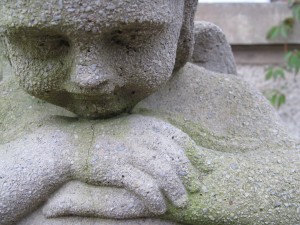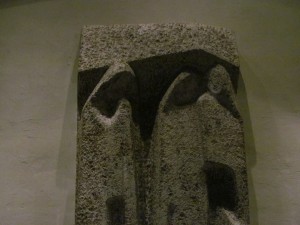“Wisdom does not come to us in snippets and sound bites but instead in deep rhythms to be revealed and discovered as we ponder and seek. “
I was visiting this week with my mom who has dementia. It is interesting and sad to notice that her responses to questions are increasingly disconnected from reality. Her brain’s process of sorting and seeking real-time data in response to a question have become so slow that she simply offers an answer, nabbed somewhere from the recesses of her mind. There is no need for pause. No tolerance for uncertainty or questioning. No reflection. Just an answer that feels true to her but sometimes holds little connection with reality or wisdom. They say we don’t appreciate what we have until we’ve lost it. I am beginning to wonder if, among the many things she has lost in the course of this journey, this loss of her ability to ponder is the most significant.
Unfortunately, she’s not the only one. The “impatient brain syndrome” (not an official diagnosis) may exist in epidemic proportions. A wise friend of mine wrote this on her blog this week:
…My brain is always twitchy, never at rest, always ready for the next thing. Likewise, my mind is always cycling through the to-do list, the email inbox, the Facebook updates, the texts and the rest. Like many people, I check my phone before I get out of bed in the morning and when I go to bed at the end of the day. I work broadly, getting a lot done, but not deeply, since I am constantly distracted…. Maybe my brain will heal itself. Maybe it will regain its God-given ability to ponder, to single-task, to plumb the depths and the heights of . . . well, just about anything.
I confess that I caught myself checking my phone for messages during church not long ago and wondered at my own twitchy brain.
But it was my friend’s naming of our “God-given ability to ponder” that set me on this journey of wondering about the high cost of becoming a ponder-less people.
It is interesting that we know so little about Mary, the mother of God, but one thing we are told is that she pondered.
19 But Mary treasured up all these things and pondered them in her heart. Luke 2
I wonder if her propensity for pondering was a part of why she could see and hear angels and be open enough to say, “Yes” to such a wild suggestion. Perhaps she had already playfully imagined such an impossibility somewhere along the way in her girlhood. Though often affirmed for her courage and obedience and faith, we’ve seldom connected the dots and imagined how much Mary’s tendency to ponder had to do with those more “productive” attributes.
Another friend of mine sent me this article by Chris Hedges about the high cost any culture pays for not protecting space for people to use their imaginations.
Our corporate culture has effectively severed us from human imagination. Our electronic devices intrude deeper and deeper into spaces that were once reserved for solitude, reflection and privacy. Our airwaves are filled with the tawdry and the absurd. Our systems of education and communication scorn the disciplines that allow us to see. We celebrate prosaic vocational skills and the ridiculous requirements of standardized tests. We have tossed those who think, including many teachers of the humanities, into a wilderness where they cannot find employment, remuneration or a voice. We follow the blind over the cliff. We make war on ourselves.
With imagination being such a large part of what makes us human and such a significant piece of the Image of God within us,
Can we afford to become a ponder-less people?
How can we create and protect space for pondering?
How can we begin to see and speak and act out its value in the Kingdom of God?
My ponder-prone friend Jonny Baker recently wrote about a Yoko Ono exhibit with wish trees outside the gallery.
I wish to be a woman who ponders.
I wish to live among people who ponder.
In the process of reading Jonny’s words, I thought of one more woman who might have something to add to this conversation: Lady wisdom in Proverbs 2.
1 My son, if you accept my words
and store up my commands within you,
2 turning your ear to wisdom
and applying your heart to understanding—
3 indeed, if you call out for insight
and cry aloud for understanding,
4 and if you look for it as for silver
and search for it as for hidden treasure,
5 then you will understand the fear of the Lord
and find the knowledge of God.
6 For the Lord gives wisdom;
from his mouth come knowledge and understanding.
This woman is not an easy catch. She demands an ever-increasing investment from the seeker. Wisdom does not come to us in snippets and sound bites but instead in deep rhythms to be revealed and discovered as we ponder and seek.
We are a busy people. Pondering comes at a price.
At the same time, have we really considered the even higher cost of becoming a ponder-less people?
Do you ponder?















